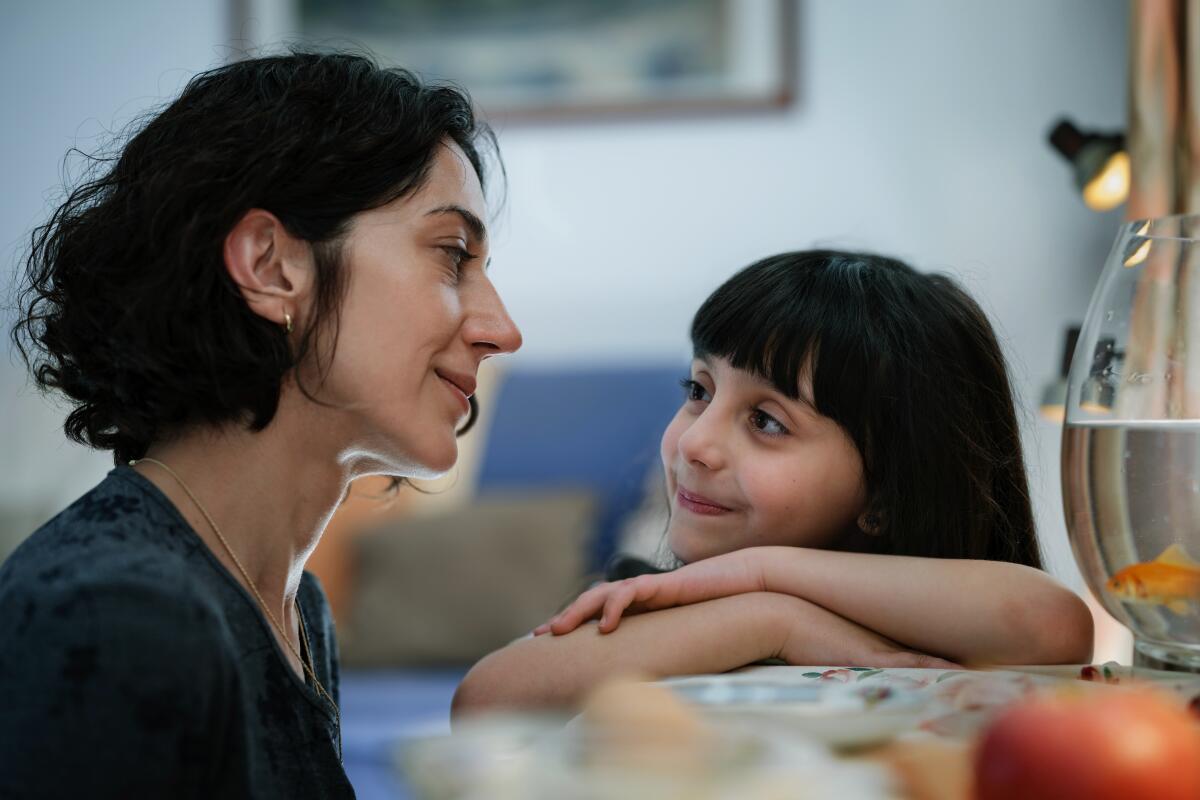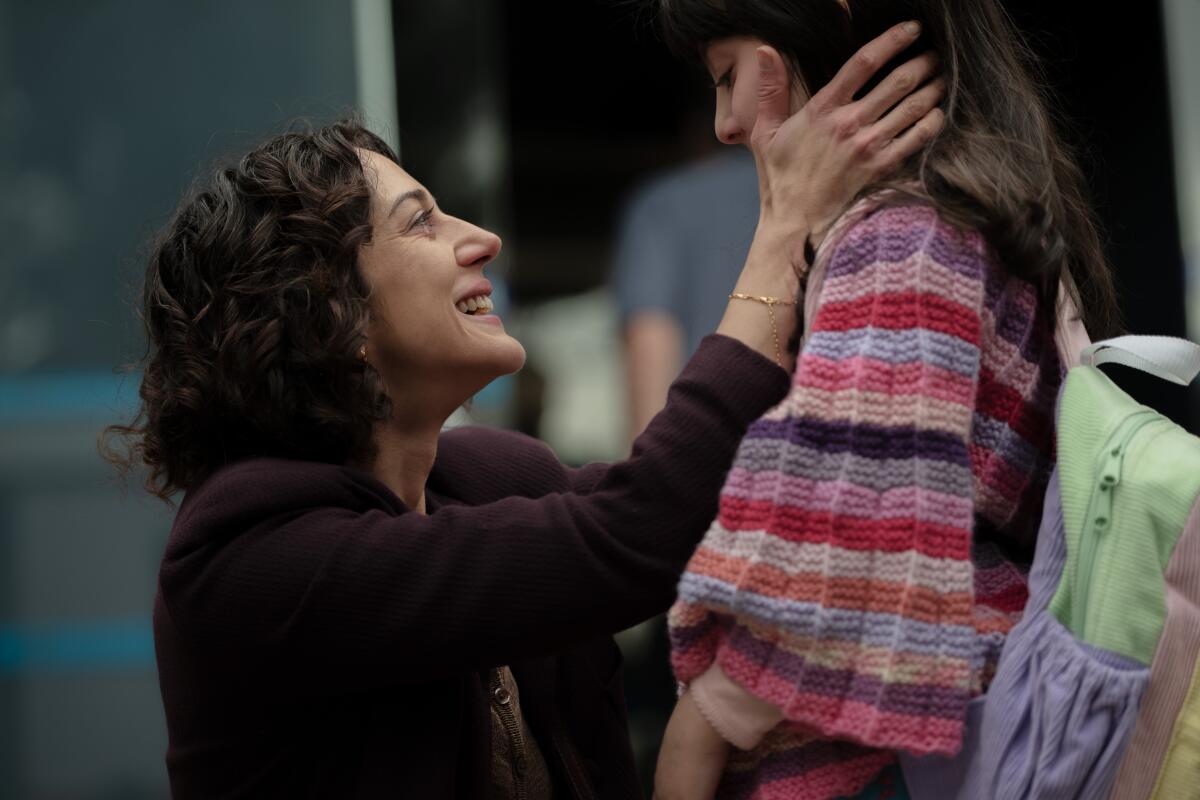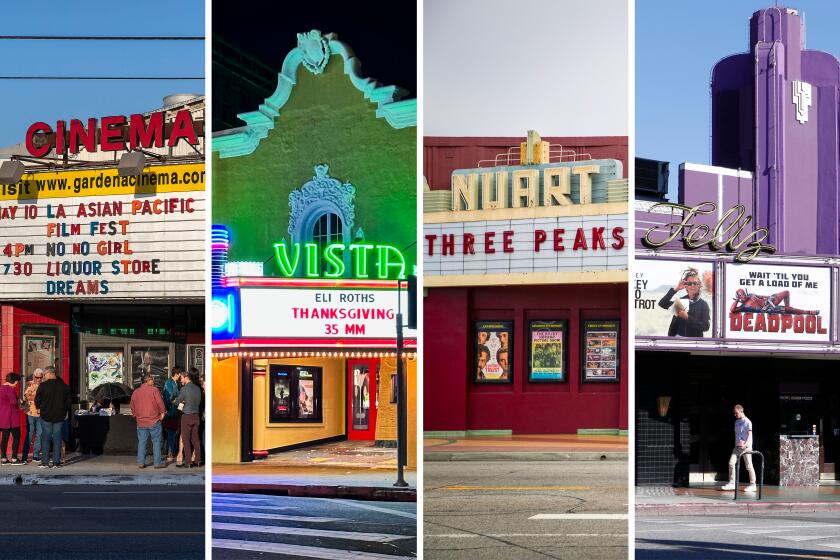In ‘Shayda,’ a woman’s escape sheds light on her abuser — and a patriarchal culture

- Share via
Hope and fear vie for prominence throughout Noora Niasari’s debut feature “Shayda,” in which Zar Amir Ebrahimi (“Holy Spider”) enthralls as a Persian mother living in Australia who takes refuge in a women’s shelter with her 6-year-old daughter Mona (Selina Zahednia). Every time the camera holds on Shayda — looking out a window, composing herself, buoying the child she’s trying to keep safe — the battle in her is palpable, to not give in to a very real and justifiable apprehension about their fate.
That the movie exists is, on one level, evidence of victory: Set in 1995, it’s drawn from the real-life experience of Niasari’s own mother, who left her husband when the filmmaker was a child, a bid for freedom that has borne fruit in a vital new directing voice from the Iranian diaspora. “Shayda” won a Sundance award last year, and recently earned Niasari a DGA nomination for first feature.
It’s not necessary to know the origins of “Shayda,” however, to get swept up in its moment-to-moment tension, starting with an airport scene that lays out the hair-raising stakes: Can this new runaway mom, with the help of kind shelter worker Joyce (Leah Purcell), get a confused, vulnerable child to memorize where they are — and remember which uniform to run to — in case Daddy suddenly absconds with her?

After that, we enter shelter life inside a plain-looking two-story suburban house in an unidentified city, Niasari cagily leaving out details (even establishing shots) to heighten our sense of a protected space, but also a freshly anonymous life. Shayda tries her best to create a normal existence for Mona, albeit one under the same roof as other women enduring a similar trauma.
That community proves beneficial, as does prepping a table for the upcoming Persian new year’s celebration Nowruz, which offers Shayda solace in beloved ritual, and for the film, some helpfully metaphoric visuals, like a carefully tended bowl of sprouting herbs, or a spirited gathering where participants jump over fire. But in every seemingly ordinary contact with the wider Iranian community — an interpreter over the phone translating her divorce petition, a close friend wanting her to socialize more, a market trip — lies a barely concealed opportunity to feel a patriarchal regime’s tarring shame. Or at worst, its potential danger.
The reemergence, owing to a court order, of Shayda’s estranged husband Hossein (an effective Osamah Sami) increases that sense of dread. Each unsupervised visit with Mona is marked by his manipulative prodding for information. In these throat-tightening scenes and their repercussions, “Shayda” is as queasily suspenseful as any recent domestic thriller has been, while thankfully avoiding the garishly exploitative (and racist) button-pushing of Hollywood dreck like “Not Without My Daughter.”
We’ve mapped out 27 of the best movie theaters in L.A., from the TCL Chinese and the New Beverly to the Alamo Drafthouse and which AMC reigns in Burbank.
Rather, what comes to mind as Niasari’s story unfolds is the urgency surrounding basic human rights that the Iranian women’s movement has advocated for since the death of Mahsa Amini in police custody in 2022. “Shayda” was filmed before that incident, but its arrival couldn’t be timelier as a portrait of a woman’s courage and resilience in the face of overwhelming pressure to weather violence, stay hidden and live unfulfilled. And in charting that road from disorienting fragility to determined independence, Ebrahimi serves up a memorably nuanced performance.
“Shayda” is not as tight as it could be and in Niasari’s understandable prioritizing of the mother and daughter holding the center of cinematographer Sherwin Akbarzadeh’s claustrophobic box frame, the orbiting figures can seem less distinct. But these are ultimately quibbles: “Shayda” achieves the remarkable feat of dramatizing authentic jeopardy while never coming across like a woman-in-peril film. In fact, what may stay with you afterward is less pain and jitters than a throughline of dancing: Shayda cheering up her daughter, letting go at a club, lightening the mood in the shelter, and enlivening a dinner party. The danger for women like her may be real, but Niasari won’t let it run Shayda’s, or this movie’s, life.
'Shayda'
In Persian and English, with English subtitles
Rating: PG-13, for thematic material involving domestic abuse, some violence and language
Running time: 1 hour, 57 minutes
Playing: Laemmle Royal, West Los Angeles
More to Read
Only good movies
Get the Indie Focus newsletter, Mark Olsen's weekly guide to the world of cinema.
You may occasionally receive promotional content from the Los Angeles Times.











